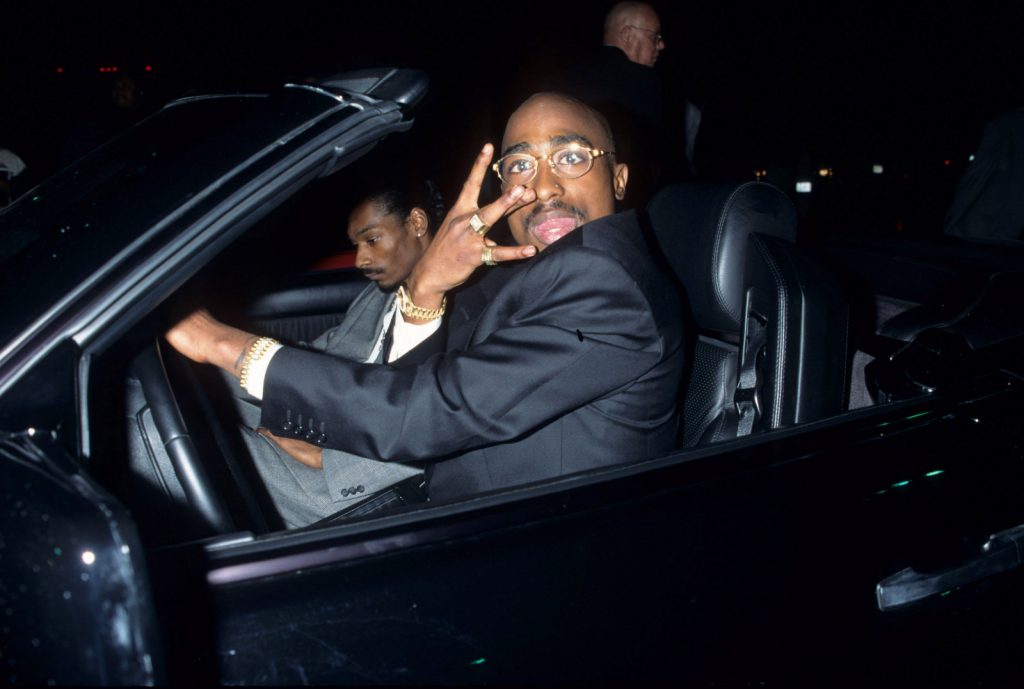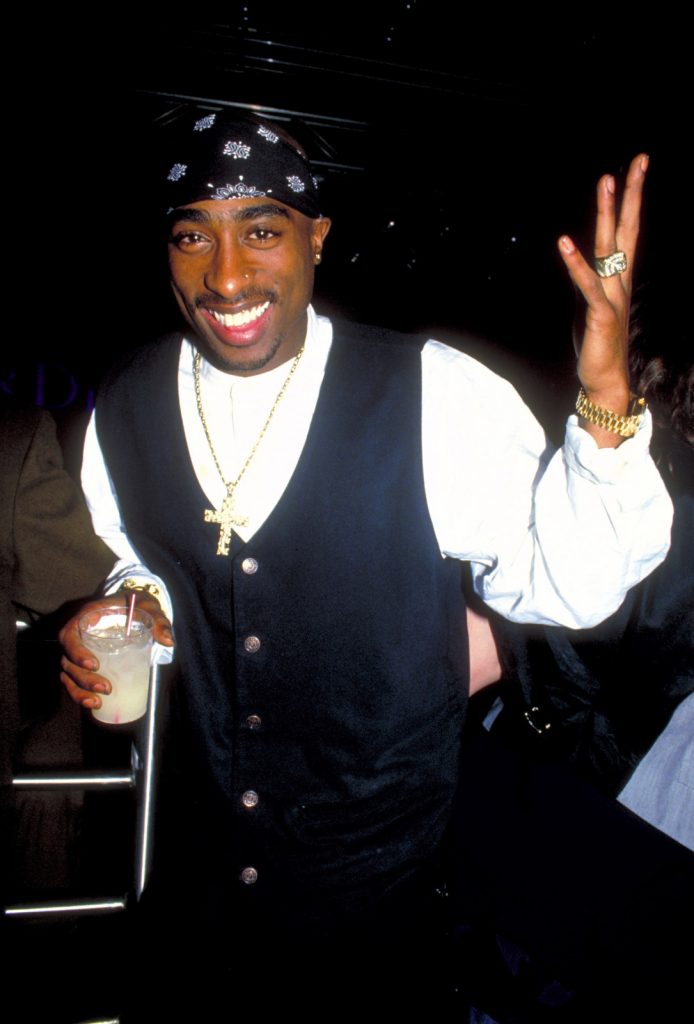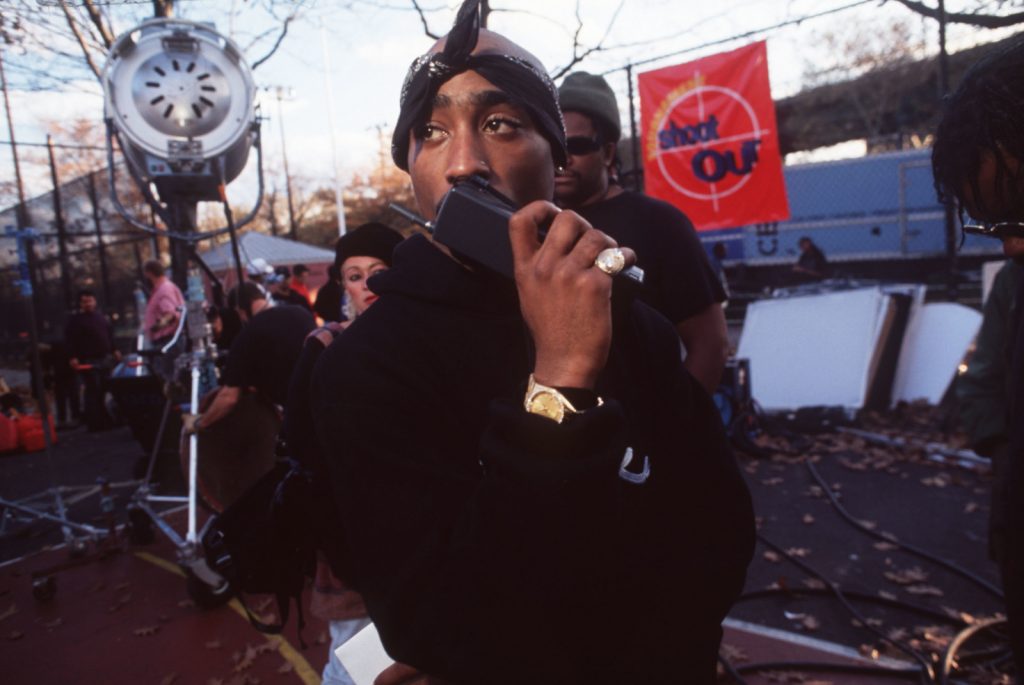American rapper, songwriter, and actor (1971-1996) Tupac Shakur poses for a portrait during the 1994 Source Awards on April 25, 1994 at the Paramount Theatre in New York, New York. (Bob Berg/Getty Images)
The image of Tupac Shakur lying on a stretcher, his head covered in bandages after being shot five times, and flashing his middle finger while being wheeled into an ambulance, is burned onto the retinas of any hip-hop fan.
It’s long been assumed that Pac was swearing at the cameramen but Chico Del Vec, a member of his nemesis Biggie Smalls’ Junior MAFIA clique, told Vice a few years ago that Pac was actually gesturing at Biggie and his crew because he believed they had been behind his attack. It’s one of the most iconic images in music history and the perfect summation of Pac’s persona: brash, raw and unshakeable.
Despite the inherent polarity of rap, rarely has a rapper divided opinion more than the late rapper and actor who was assassinated on 13 September 1996 at just 25 years old. Loved and loathed, Tupac was a paradox.
He was a universally known and prolific musical icon who was so productive during his brief career that he released more posthumous albums (five) than he did when he was alive (four).
READ MORE: China beats Hollywood with bizarre Tupac biopic
 Snoop Dogg and Tupac Shakur (Kevin Mazur Archive/WireImage)
Snoop Dogg and Tupac Shakur (Kevin Mazur Archive/WireImage)
But he was also a loose-lipped and violent character who had countless run-ins with the law and with his many rivals. A magnetic actor who showcased his versatility with charming roles on Poetic Justice and Juice, Pac was poised to be a full-on movie star. But his erratic behaviour hindered him throughout his career. One defining incident occurred in 1994 when Pac served 15 days in prison for assaulting director and long-time friend Allen Hughes after Hughes fired him from Menace II Society.
When I was in my first year of high school, some 10 years after Pac died, my friends and I idolised him. We loved his swagger, his aggression and his larger-than-life persona. We’d rap the explicit lyrics to his infamous diss track Hit Em Up word for word one moment, then the next revel in the heartfelt lyricism of Dear Mama.
Pac is notorious for his duplicity. One moment he was being rightly criticised for his overt sexualisation of women and violence (Pac’s legacy is tainted by his infamous sexual assault case, for which he spent time in prison), the next he was exhibiting a deep compassion and resonance for the struggle of Black America.
Despite his all-round talents and his wild controversies, what Pac is best remembered for is his music. In undertaking the arduous task of listing his best songs across his sprawling catalogue, I inevitably excluded some incredible music. But that’s how lists go — they’re incomplete and often contentious, but I hope in some way this provides a solid purview as to the best songs of Pac’s illustrious career.
 Tupac Shakur (Steve Eichner/WireImage)
Tupac Shakur (Steve Eichner/WireImage)
Collabs
“That’s why I fucked your bitch, you fat motherfucker,” opens Hit Em Up in arguably the most famous opening line in rap history. Backed by his Outlawz crew, Pac then proceeds to launch into a devastating attack on his biggest rival Notorious B.I.G, P. Diddy, Mobb Deep and seemingly the entire East Coast.
- All Eyes On Me ft. Big Syke
Having just signed with Suge Knight’s Death Row Records after his release from prison, all eyes were on Tupac in 1996. In typically flamboyant style, Pac waxes lyrical about his flashy lifestyle and owns his moment in the spotlight on the title track of the final album he released while alive. While Big Syke, who was part of Pac’s rap group The Outlaw, delivers an unremarkable verse here, it doesn’t derail the record.
- California Love ft. Roger and Dr Dre
California Love was originally legendary West Coast star Dr Dre’s single. But when Pac came out of prison, Suge made sure to hog every hot record on the label and redirect it to Pac’s album. California Love might very well be the best of the lot and marked one of the few occasions Pac achieved a true crossover hit. It even topped the Billboard Hot 100 and was nominated for a Grammy a year after his death.
- Runnin (Dying To Live) ft. Notorious B.I.G
“I wonder if they will live when I am dead,” opens Runnin, the single from the posthumous soundtrack album Tupac: Resurrection, which was released years after both Tupac and Notorious had died. On it, the two late rivals showcase the best of their talents on a seering, hard-hitting beat by Eminem, who would later executive produce the stellar project Loyal To The Game.
- 2 of Amerikaz Most Wanted ft. Snoop Dogg
Pac wasn’t always known for his flow, but on this single he and new labelmate Snoop Dogg brought out the best in each other as they showcased why they were the two hottest rappers on the West Coast. The title of the song references both rappers’ history of legal issues and run-ins with the law at the time.
READ MORE: Tupac to be given final resting place in Soweto
 American rapper Tupac Shakur on the set of “Above the Rim” in Harlem. (Mark Peterson/Corbis via Getty Images)
American rapper Tupac Shakur on the set of “Above the Rim” in Harlem. (Mark Peterson/Corbis via Getty Images)
Conscious songs
Originally written by Pac for fellow Death Row rapper M.C. Hammer, Unconditional Love is a poignant expression of Pac’s view of true love. It marked a rare moment of sober contemplation where Pac expressed his hope of finding a peaceful life, his troubled upbringing and a painful discussion he had with his mother about death.
- I Ain’t Mad At Cha ft. Danny Boy
Recorded on his first night out of prison after Suge Knight orchestrated his release, I Ain’t Mad At Cha is a heartfelt tale of an incarcerated friend finding Islam in prison and the friends he’s grown apart from over the years. Despite his feeling like some of them turned their back on him, he ain’t mad at them cause that’s just life. It’s all good.
“A place to spend my quiet nights, time to unwind. So much pressure in this life of mine, I cry at times.” This was Pac at his vulnerable best. Shedding the tough-guy image, he also spoke on thoughts of suicide, his feeling unloved and a desire for some respite from the pain of everyday life.
The title track on Pac’s third posthumous album, Until The End of Time, is an uptempo bop that sees Pac reminiscing on his complex friendships. It also sees Pac as paranoid as ever about his death and the consequences for his life of sin.
Tupac had an uncanny gift to bring you into his world and make you feel his pain. While he raps about familiar themes — tales of the friends he’s lost to the streets and how he’ll celebrate them til his last days — Pac finds a way to bring a different energy and perspective on Life Goes On. He also speaks on his death and shares his desire for his people to party and celebrate at his funeral.
Top hits
While Bobby Caldwell’s vocal sample from What You Won’t Do for Love is the driving force behind this single, Pac’s conviction in his storytelling makes this one of his most infectious cuts. The first verse is one of Pac’s most gripping. On it, he grapples with the idea of leaving a jealous lover before eventually returning because he’s a sucker for love.
Keep Ya Head Up sees Pac at his charming best as he advocates for issues such as the pro-choice movement and celebrates the importance of women in society. It’s also a rallying cry for “real men” to stand up and do right by their women. “Please don’t cry, dry your eyes never let up,” he raps. “Forgive but don’t forget girl keep your head up.”
Pac mentioned his mother a lot in his music. A former member of the radical Black Panther Party, Afeni Shakur was released from prison a month before Pac was born. While she battled through drug abuse, Pac pays homage to how she still found a way to hustle and provide for her family. The song opens with her speaking about this journey, before Pac beautifully unpacks his deep love for her.
Never has Pac’s music been more urgent, focused and compelling as it was on his posthumous classic Ghetto Gospel. Eminem’s production and Elton John’s soulful hook all blend perfectly to pave the way for Pac’s musings on poverty, the futility of war and his imperfections as a human being.
The lead single on his greatest hits compilation, Changes is the quintessential 2Pac hit. “I’m tired of being poor, and even worse, I’m black. My stomach hurts so I’m looking for a purse to snatch,” he raps as he tackles the complexities of poverty. He also goes on to denounce police brutality and black on black crime on this timeless hit.